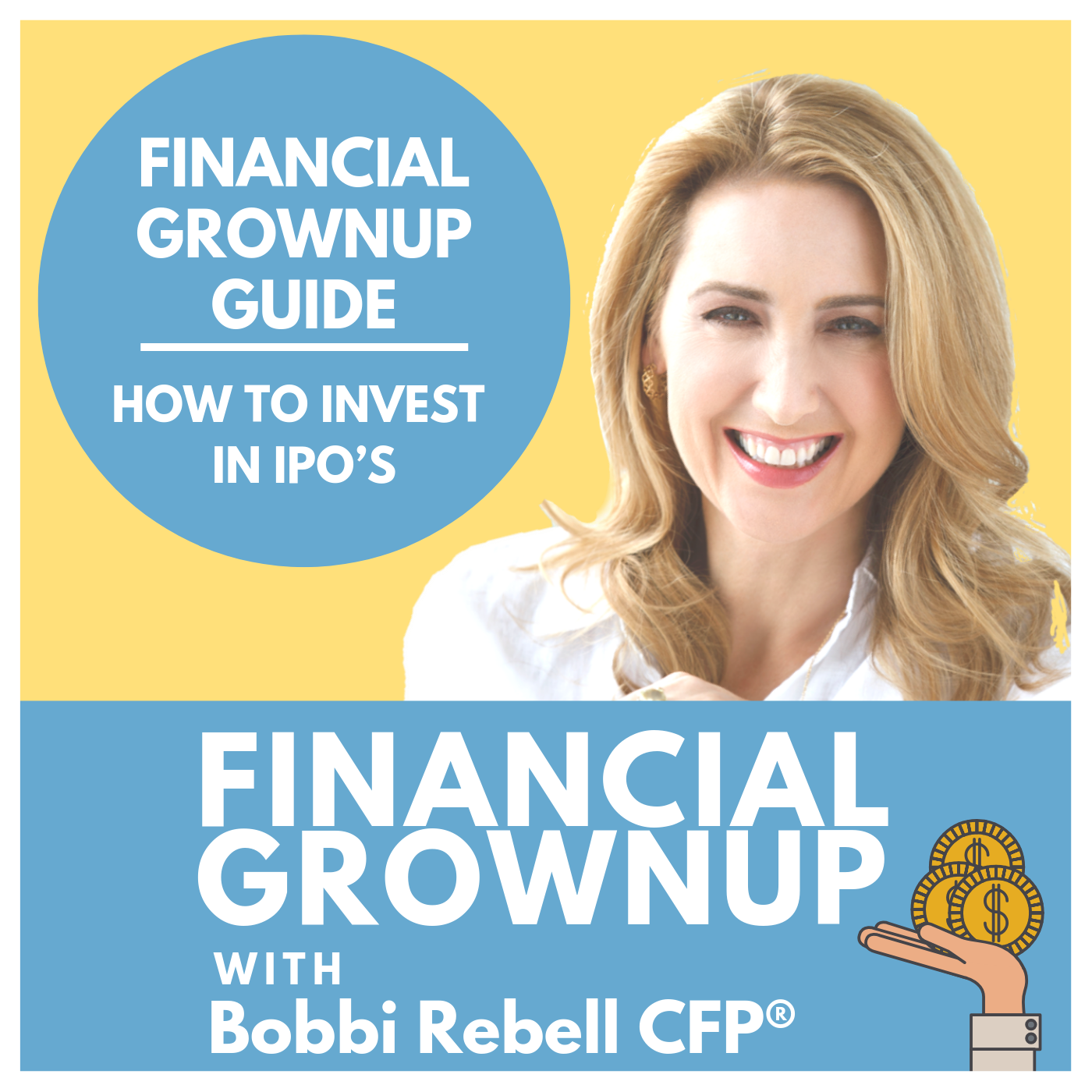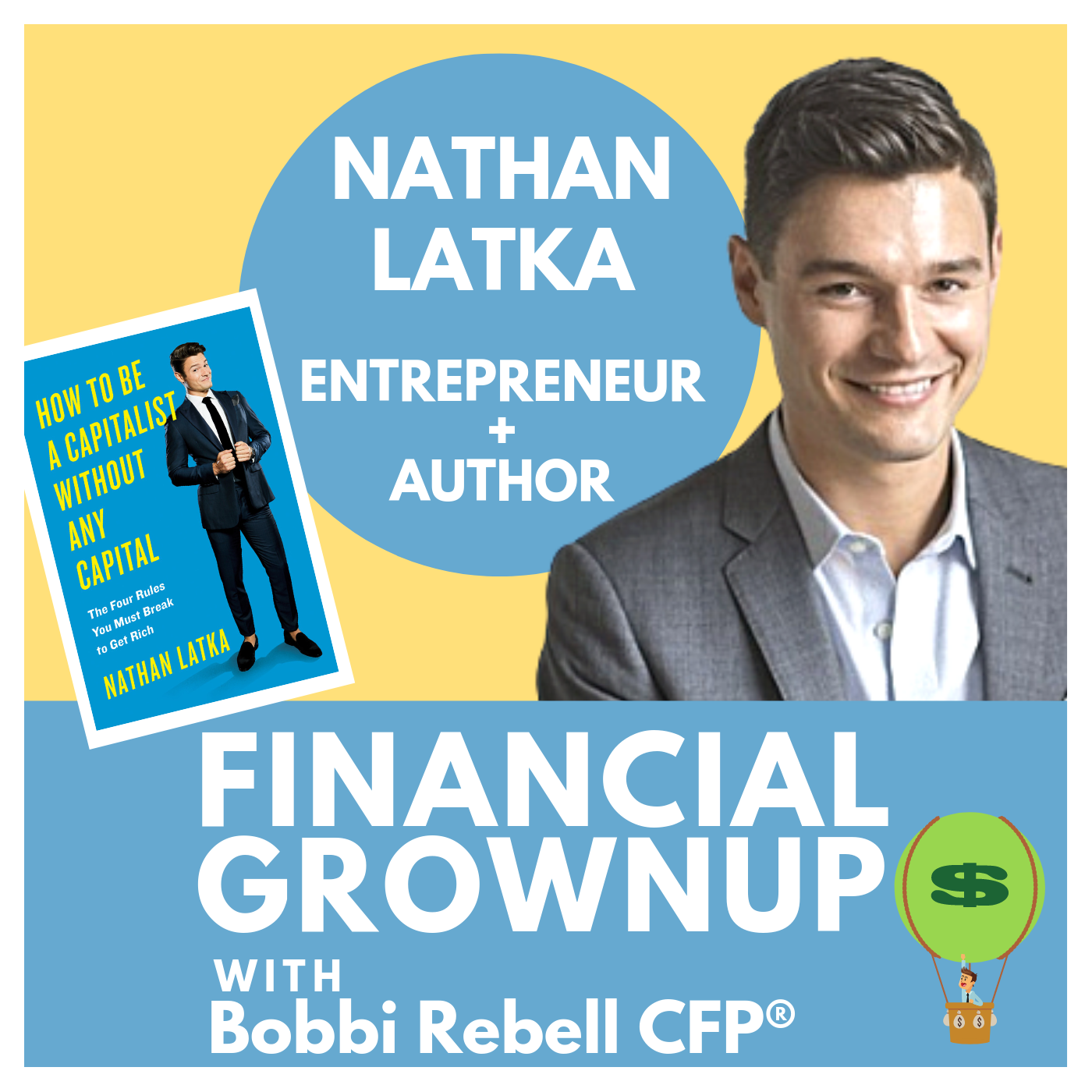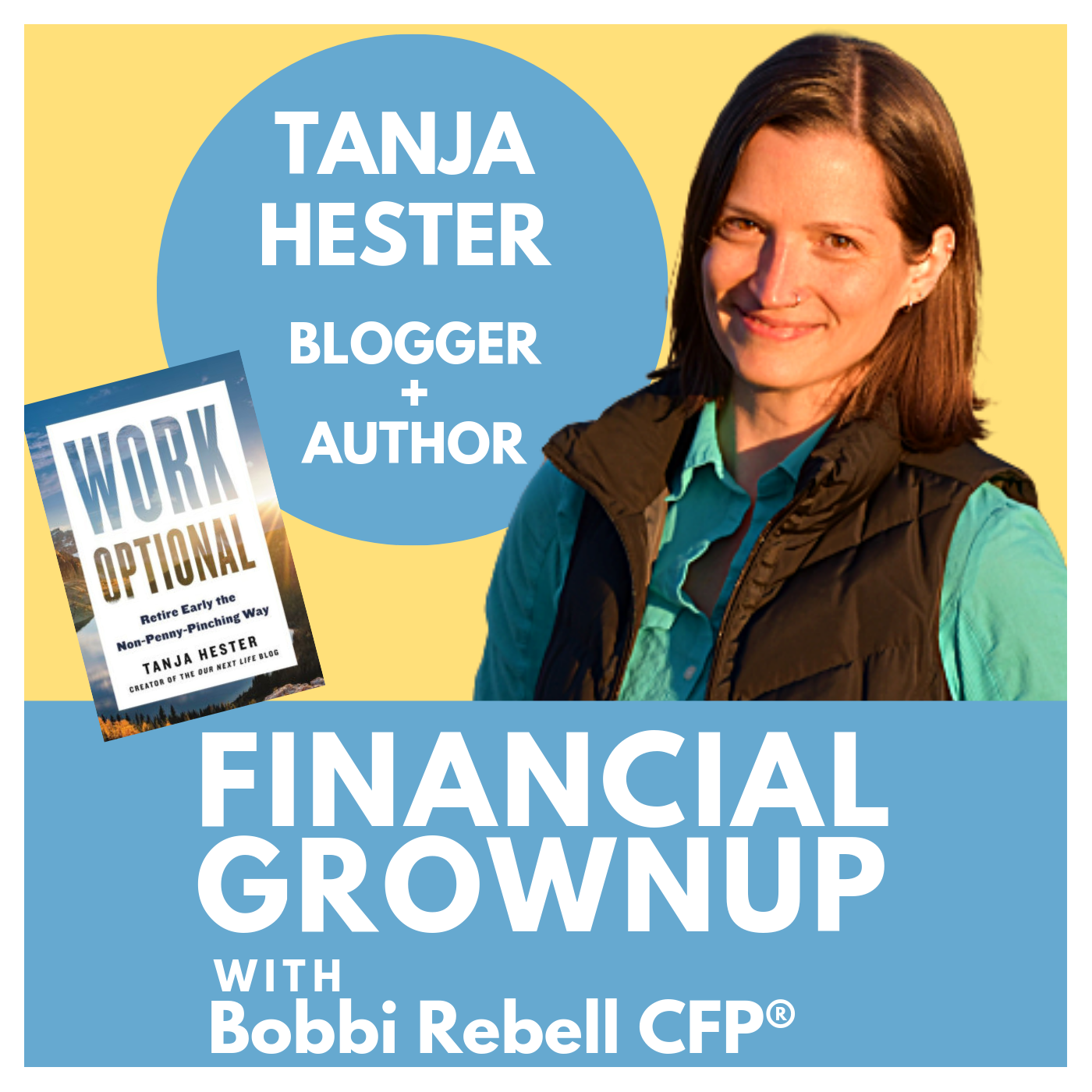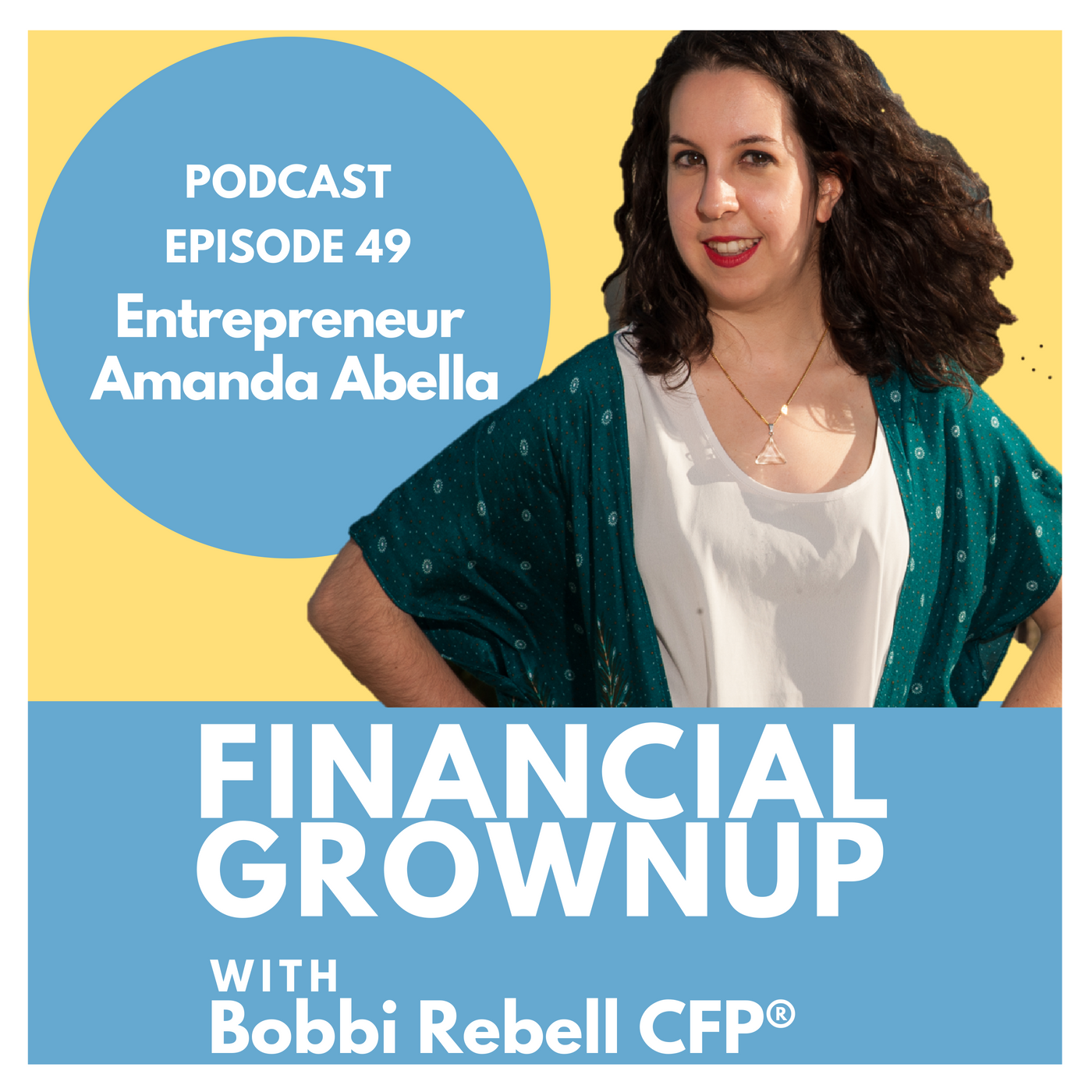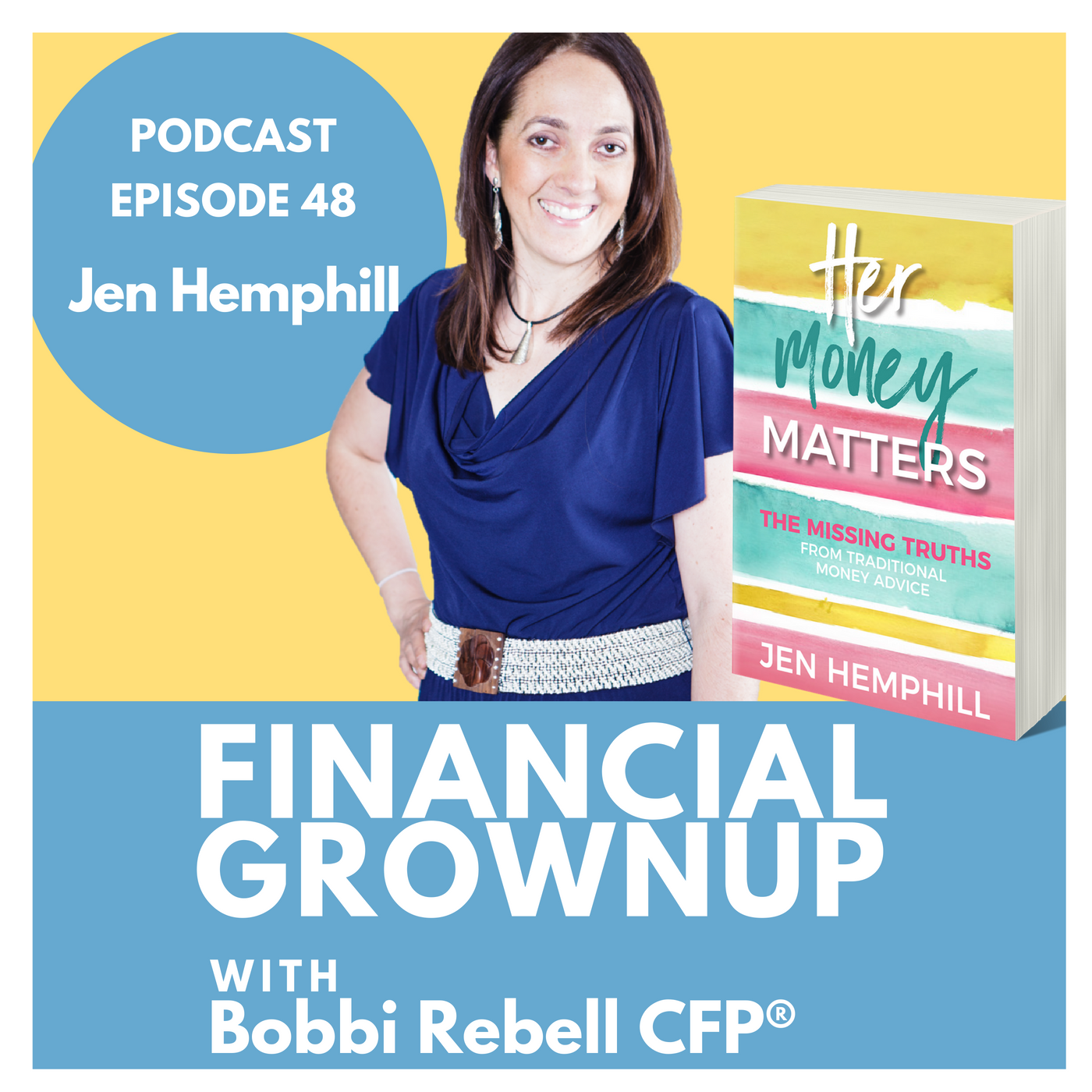Transcription
Courtney Reum:
They certainly tried to show us and explain that there's some nutrition here. Back then it was like I call the Jane Fonda Jazzercise, so it was they were like, "This is not too much fat, not too much calories. It's good, heres why," and so I equate the not too much fat, not too many calories to just the value of the meal, and so they were all about the value in things.
Bobbi Rebell:
You're listening to Financial Grownup, with me, certified financial planner, Bobbi Rebell, author of How to Be a Financial Grownup. You know what? Being a grownup is really hard, especially when it comes to money, but it's okay, we're going to get there together. I'm going to bring you one money story from a financial grownup, one lesson, and then my take on how you can make it your own. We got this.
Bobbi Rebell:
Hey Financial Grownup friends, that was Courtney Reum talking about family dinners growing up, and this is on family. They eat together generally seven nights a week, and while, as you will hear in his story, it wasn't about the food, the food did provide a largely unspoken lesson about money allocation and priorities. I'm really excited to share this story, I think we're all going to find something that we can relate to here and put to work in our own lives.
Bobbi Rebell:
All right, first a quick welcome. We keep things short here, around 15 minutes. Flex time for our busy listeners because you can listen to one episode or you can listen to a few if you have more time. Make sure to subscribe if you haven't done so already, so you won't miss any upcoming episodes, and make sure when you do so, to go into settings and set you the auto-download. That way you never have to think about it again. If you have a free moment after that, leave a review. We see every one of them, we really appreciate it, and it is the best way for other people to hear about the show and for us to grow. Speaking of that, of course you can also tell a friend.
Bobbi Rebell:
All right, let's get to Courtney. There is something in this episode for everyone. Courtney Reum is not as famous as he should be, or as he will be. Pay attention to this guy, and his brother by the way, who's also his business partner, Carter. After stints at Goldman Sachs and success creating and then selling their popular spirits company, VeeV, the brothers are now helping nurture other success stories with their company M13. It's a disruptive brand development studio and venture capital firm. Their portfolio incudes investments in some names you may or may not have heard of, like Lyft, ClassPass, Pinterest, Bonobos, Warby Parker and more.
Bobbi Rebell:
By the way, in their spare time, they wrote a book for anyone who wants to rev up their brand, Shortcut Your Startup. Courtney also drops some random facts I never knew, and I bet you didn't either, so play close attention, here is Courtney Reum.
Bobbi Rebell:
Courtney Reum, you're a financial grownup, welcome to the podcast.
Courtney Reum:
Thanks so much for having me. Great to be here.
Bobbi Rebell:
I'm so excited to have you. Not only are you, and your brother I should say, the inventors of Veev, which a lot of people are fans of, you now have a new company which we'll talk more extensively about after your money story, but M13, which is a brand development company, you have investments in a lot of really cool companies, from ClassPass, to Casper, to Lyft. Tell us just briefly about it. What is M13? M13 has a really cool origin, the name right?
Courtney Reum:
Yeah. Well we wanted to have that mysterious MI6 kind of I don't know what they do, but it must be something cool sound to it. But the literal name, M13, is the brightest cluster of starts in the galaxy, whereby the sum of the whole shines greater than the individual parts. It's this idea of connecting the dots and pitting the pieces together, which is what we're really endeavoring to with M13.
Bobbi Rebell:
Cool. I should mention you also have a book.
Courtney Reum:
We do. What we're trying to do right now with M13 is build a company for building companies, so we're starting some of our own, we're working with other companies, and so we have a, I guess I'd call it a venture capital arm and then a brand development studio, and we're really trying to institutionalize the platform or the machinery of how you create brands. We decided to try to codify that and write a book called Shortcut Your Startup, that is a lot of the principals and things we're doing, because we believe it's the new age of creating consumer brands and things like that, so we wanted to share what we've learned and then hopefully continue to improve on it with what we're doing with M13.
Bobbi Rebell:
Love that. You also learned a lot from your parents growing up. I know your father unfortunately passed away a little more than a year ago, but there were a lot of lessons around the dinner table, about saving and splurging. Tell us your money story Courtney.
Courtney Reum:
I think one of my most vivid memories growing up is that my family was really big on the lost art of having family dinner, probably almost until the time we got to high school, we probably did it seven days a week just about, and even through high school, probably four or five, which I think is almost unheard of. But what stands out to me is my parents, who were very frugal even when they didn't have to be, but always very value oriented, we would probably, four nights a week, eat some kind of Stouffer's, Lean Cuisine, AKA TV dinner. The only real choice for the night would be are we going to have spaghetti tonight or are we going to have chicken and vegetables? Whatever it may be.
Bobbi Rebell:
Right. But your mom wasn't cooking spaghetti from scratch, these were heat-up meals for $5, $10, whatever they were going for at that time.
Courtney Reum:
Right, because I remember being teenager, and I was always a little bit of a smart you know what, and my mom would say, "Okay, I'm going to cook dinner," I'm like, "You call that cooking?" She's like, "You know what I mean, just pick which one you want." I think my family's a bunch of type A busy bees, people on the go, but we would have TV dinners three or four nights a weeks, and then Sunday would always be the day where my parents would say, "All right, we're going to go out for a nice dinner. Where do you guys want to go?" Nine out of 10 times, growing up in Chicago in the 90s we'll say, it would be sushi, and despite what people may think now, sushi was super exotic.
Bobbi Rebell:
Oh yeah.
Courtney Reum:
And rare back then, to the point that not one friend of mine ate sushi. My friends in high school, like on the football team and stuff, when I would walk somewhere with a cut roll of sushi, they would take it out and throw it back and forth like it was an egg toss because they were so wowed by what the heck sushi was. Anyways-
Bobbi Rebell:
And it was expensive.
Courtney Reum:
Yeah, and it was expensive. We certainly grew up having every opportunity, but having said that, I could not have gone out for sushi four nights a week, so it was a great lesson in all right, I'm going to have a TV dinner tonight, not realizing how some of those nitrates and processing and all that good stuff.
Bobbi Rebell:
It was a different time. Give your parents a break. We didn't know at the time. Now we're all eating clean.
Courtney Reum:
Yes, exactly, but I definitely was able to scoff down a few of those dinners, knowing that Sunday was around the corner and we were going to have our favorite sushi dinners.
Bobbi Rebell:
Did your parents ever talk to you about the financial decisions behind that?
Courtney Reum:
My parents didn't explicitly talk about it, but they certainly tried to show us and explain that, "Hey, we don't have time, nor can we go out for sushi every night, but this is still a really good meal. There's some nutrition here." Back then it was like I call the Jane Fonda Jazzercise, so it was they were like, "This is not too much fat, not too much calories. It's good, heres why," and so I equate the not too much fat, not too many calories to just the value of the meal, and so they were all about the value in things.
Bobbi Rebell:
For our listeners, what is the takeaway? How can people apply this lesson of saving and then splurging to their own lives?
Courtney Reum:
My parents are both highly disciplined people, and I would like to think that has trickled down to us. Even to keep it with food, since it's such a bonding occasion, my parents loved to tell stories of living in New York City right after they graduated college, and they would go out to dinner once a week because they felt like it was important to do right when they were newly weds, but they couldn't afford to really go out to dinner, so they would share one appetizer, one entree, one dessert and one coffee. The fact that they had the discipline to still find a way to enjoy and make the most of whatever they could do, but they had the discipline to realize we can't go out for a full-blown meal all the time, and that made a big impression on me.
Bobbi Rebell:
What's the most memorable financial lesson your dad taught you?
Courtney Reum:
My dad checked every bill from every restaurant. Whether we spent $7 or $70, he would check every bill. Still to this day, I do that, and I'm shocked how often there's a mistake on the bill, and most people, if you don't really check it closely, they don't catch it. They're like oh, they threw another drink on there, and maybe you don't care, but you might as well at least know. My dad would always joke, "It's funny how the restaurant very rarely makes an error in your favor." He just taught me to really dot your Ts and cross your Is, and my dad was one of those guys who could do incredible math in his head. None of this stuff where you just take the amount of the check and double it to do the tip or something like that, he would calculate whatever number was in his mind, 16%, 17%, without tax because he didn't believe you tipped on tax back then, and just do it in his head and write it down. Just having a facility with numbers and being in the details was something I really took from him.
Bobbi Rebell:
Right. He didn't have apps that would split things up and calculate everything for him.
Courtney Reum:
No calculators on his phone because there was and phones. He was like a human calculator, at least up to maybe two or three digits.
Bobbi Rebell:
For our listeners, what's the takeaway from that?
Courtney Reum:
I think there is that old fashioned way to do things, and we've got to make sure [inaudible 00:09:20] where we don't lose it in the world of talk to text or voice or you name it, because I always say to people, "Do you know why telephone numbers are seven digits, not including area code? Because seven digits is roughly the amount of digits that can stay in you short-term memory, depending on how you define that, 30 seconds to a minute, this can stay in your memory and you can remember it. Back in the day when phone numbers were created, you really needed to remember that thing, or even if you wrote to down, and so it was important that it stayed in your short-term memory." Now think how few numbers we actually know off the top of our head, so we have to make sure we just don't lose those skills.
Bobbi Rebell:
I love that. Speaking of skills, let's talk about your everyday money tip, because we were joking before we started taping, that you are ... I can't even keep track Courtney. I know you got off an overnight, but then it was delayed and you were on the tarmac. You travel a lot and you don't use a lot of cash, but cash is important in terms of this one everyday money tip that you're going to share.
Courtney Reum:
Yes. I always keep an emergency $100 bill, just for a rainy day, in my briefcase. My briefcase is more of a tech Tumi backpack, but I always keep it in there, try to always replenish it when I use it, and as silly as it sounds, obviously it takes up no room and there are so many times where I'm some place, I'm like, "I have no money," I'm like, "Wait. The emergency 100." I would encourage people, whether it's an emergency 20 or 50 or 100, whatever it is, always hide it from yourself so you don't use it too often, but then always have it available.
Bobbi Rebell:
Great advice, and something we all should definitely do. All right, let's talk a little bit more about M13. Where are you taking this company? Because this was basically formed after you sold Viiv, what's happening with it next and what should we look forward to hearing about?
Courtney Reum:
Yeah, as I alluded to, I think our whole thing when we sold Viiv, was we had started and operated some companies, we had been on the boards of a bunch of other companies and thankfully been successful. For example, there's a probiotic and kombucha line called KeVita, that Pepsi bought a couple of years ago. Basically, all consumer tech companies, we probably made, at that time, maybe three dozen angel investments, and we said, "You know," we tried to step back and do the proverbial lift your head up, see where the world's going, and we thought yeah, of course we could, we had plenty of ideas, we could start a new company, try to make it successful, sell it or not sell it.
Courtney Reum:
But we really think we're living in this golden age of creating brands, again, we focus on consumer tech brands, and by that I mean consumer brands that tend to be techable, so that can be anything like direct to consumer online brand, or even something like a Lyft that we're big investors in, or Pinterest.
Bobbi Rebell:
Right. Give us some more examples. Yeah, drop some names.
Courtney Reum:
Drop some names, okay. Let's see. Right now I'm wearing Bonobos pants, Warby Parker glasses, some of the mattress companies, so it's all things that we basically believe that every consumer brand needs to be saying to themselves, "How can it more of a media and tech company?" Because what's really changed is that this is the golden age of creating brands. I saw a funny meme the other day that was like I want to create a brand and someone says, "How should I do it?2 he goes, "Oh, it's really easy. You just get someone to give you a name, a logo, and then you make it in China and you sell some ads on Instagram." It obviously a joke, but there's some truth to it.
Courtney Reum:
What we're trying to do is institutionalize the process of brand building. Obviously nothing is one size fits all, but there are things that I get asked every single day like, "Hey, do you know a good digital marketing agency? Do you know someone who does that?" Rather than do the analog way of replying to every one of those, or thinking about who I know or who did I come across that week, we have actually taken all of our learnings and put it into what we call our M13 playbook, which is literally a digital repository of all our best practices and best resources. That's contacts, that distribution strategies, that's broker partners, those are relationships, and have actually put it in a format that we believe if we do this well, will help brands start faster, more time efficiently. Our book is all about time is the new money, so it's about trying to launch brands at scale so we can do it in a repeatable way and launch brands more quickly and more often than we previously would have been able to.
Bobbi Rebell:
Cool. Tell us more about where people can find out more about you and Shortcut Your Startup, which is your book, and all your social channels. I know you're a little bit shy about being too promotional on social, but people can at least see pictures of your adorable mom on your social right?
Courtney Reum:
Right, exactly. If nothing else, please read the first page of my book because it's dedicated to my dad, and please look at my social media to find my mom. My Instagram is really easy, it's just my first name and last, @courtneyreum. If you find another one of those, I would be shocked, so it should be easy to find me there. M13.co, not .com, .co because it's more trendy now.
Bobbi Rebell:
Oh, is it? Okay.
Courtney Reum:
Yes.
Bobbi Rebell:
I learn so much from you Courtney.
Courtney Reum:
Yeah. I don't do a ton with LinkedIn, but I think I've gotten about three or four requests since we've been sitting here, so that's the world we're living in, and our book, shortcutyourstartup.com, there's a website, and then of course, since the whole world is on Amazon Prime, you can certainly find us there too.
Bobbi Rebell:
Courtney, I'm so excited to see how much more you accomplish. You're so impressive. Congratulations on everything.
Courtney Reum:
Thank you so much for having me. It's been a lot of fun.
Bobbi Rebell:
Here's my take on Courtney's money story and what he had to say. Financial grownup tip number one. We focused primarily on the fact that Courtney's parents did spend a lot of time preparing or money on everyday meals, and left that to the once a week sushi splurge, but Courtney also said something very important, and that is that they ate together as a family pretty much every night. Research has shown that leads to high achievement in kids, specifically dinnertime conversation boosts vocabulary for young kids, and for school-age kids, regular mealtime is a powerful predictor of high achievement scores, more so than time spent in school, doing homework, playing sports and doing art.
Bobbi Rebell:
There's even more. Other research found that teenagers who ate family meals five to seven times a week were twice as likely to get As in school as those who ate two or fewer times a week with their families. Full disclosure here, I am aspiring to this, it is not happening yet, so I'm going to put that on my fall to do list. I will leave a link to the research in the show notes. If you want to learn more, you can find those show notes at bobbirebell.com/podcast/courtneyreum. C-O-U-R-T-N-E-Y-R-E-U-M.
Bobbi Rebell:
Financial grownup tip number two. Courtney talks about checking the bill, and how the mistakes are usually not in your favor. No matter how much money you have, check the bill. I'm not alone in having caught so many things on bills that just should not be there. It happens so much, and as for tipping, I do believe you still aren't expected to tip on the tax, even though tipping expectations have certainly gone up in recent years.
Bobbi Rebell:
By the way my friends, did you catch the random knowledge about phone numbers that Courtney shared? Rewind if you need to. I was fascinated. Maybe everyone knows that and I'm the only one. Anyway, Courtney crammed some amazing wisdom into this episode, raising the bar for my future guests, just saying. Keep an eye on this guy, and thanks Courtney, for helping us all get one step closer to being financial grownups.
Bobbi Rebell:
Financial Grownup with Bobbi Rebell is edited and produced by Steve Stewart and is a BRK Media production.



